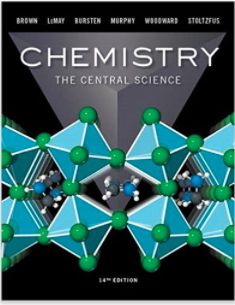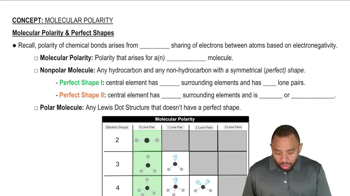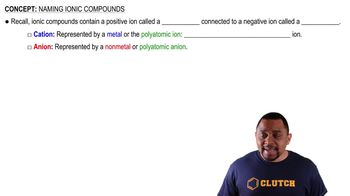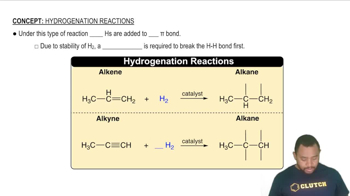Which of the following in each pair is likely to be more soluble in hexane, C6H14: (a) CCl4 or CaCl2, (b) benzene (C6H6) or glycerol, CH2(OH)CH(OH)CH2OH, (c) octanoic acid, CH3CH2CH2CH2CH2CH2CH2COOH, or acetic acid, CH3COOH? Explain your answer in each case.
Ch.13 - Properties of Solutions

Brown14th EditionChemistry: The Central ScienceISBN: 9780134414232Not the one you use?Change textbook
Chapter 13, Problem 34b
Which of the following in each pair is likely to be more soluble in water: (b) propionic acid (CH3CH2COOH) or sodium propionate (CH3CH2COONa)
 Verified step by step guidance
Verified step by step guidance1
Identify the nature of each compound: Propionic acid (CH3CH2COOH) is a carboxylic acid, while sodium propionate (CH3CH2COONa) is a salt formed from the neutralization of propionic acid with sodium hydroxide.
Consider the solubility rules: Generally, salts of sodium (Na+) are highly soluble in water due to the strong ionic interactions between the ions and water molecules.
Analyze the molecular interactions: Propionic acid can form hydrogen bonds with water due to its -COOH group, but it is a weaker acid and less ionized in water compared to its sodium salt.
Compare the solubility: Sodium propionate, being an ionic compound, will dissociate completely in water, increasing its solubility compared to the molecular form of propionic acid.
Conclude based on solubility principles: Sodium propionate is likely to be more soluble in water than propionic acid due to its ionic nature and the presence of the highly soluble sodium ion.

Verified video answer for a similar problem:
This video solution was recommended by our tutors as helpful for the problem above.
Video duration:
3mWas this helpful?
Key Concepts
Here are the essential concepts you must grasp in order to answer the question correctly.
Polarity and Solubility
The principle of 'like dissolves like' states that polar substances tend to dissolve in polar solvents, while nonpolar substances dissolve in nonpolar solvents. Water is a polar solvent, meaning that ionic and polar compounds are generally more soluble in it. Understanding the polarity of the molecules in question is crucial for predicting their solubility.
Recommended video:
Guided course

Molecular Polarity
Ionic Compounds in Water
Ionic compounds, such as sodium propionate, dissociate into their constituent ions when dissolved in water. This dissociation increases the interaction with water molecules, enhancing solubility. In contrast, molecular compounds like propionic acid may not dissociate as completely, affecting their overall solubility in water.
Recommended video:
Guided course

Ionic Compounds Naming
Hydrogen Bonding
Hydrogen bonding occurs when hydrogen is covalently bonded to a highly electronegative atom, such as oxygen, creating a polar molecule. Both propionic acid and sodium propionate can form hydrogen bonds with water, but the presence of the ionic sodium ion in sodium propionate enhances its solubility due to stronger interactions with water compared to the neutral propionic acid.
Recommended video:
Guided course

Hydrogenation Reactions
Related Practice
Textbook Question
1
views
Textbook Question
Which of the following in each pair is likely to be more soluble in water: (a) cyclohexane (C6H12) or glucose (C6H12O6),
Textbook Question
Which of the following in each pair is likely to be more soluble in water: (c) HCl or ethyl chloride (CH3CH2Cl)? Explain in each case.
Textbook Question
Indicate whether each statement is true or false: (c) As you cool a saturated solution from high temperature to low temperature, solids start to crystallize out of solution if you achieve a supersaturated solution.
Textbook Question
Indicate whether each statement is true or false: (d) If you take a saturated solution and raise its temperature, you can (usually) add more solute and make the solution even more concentrated.
